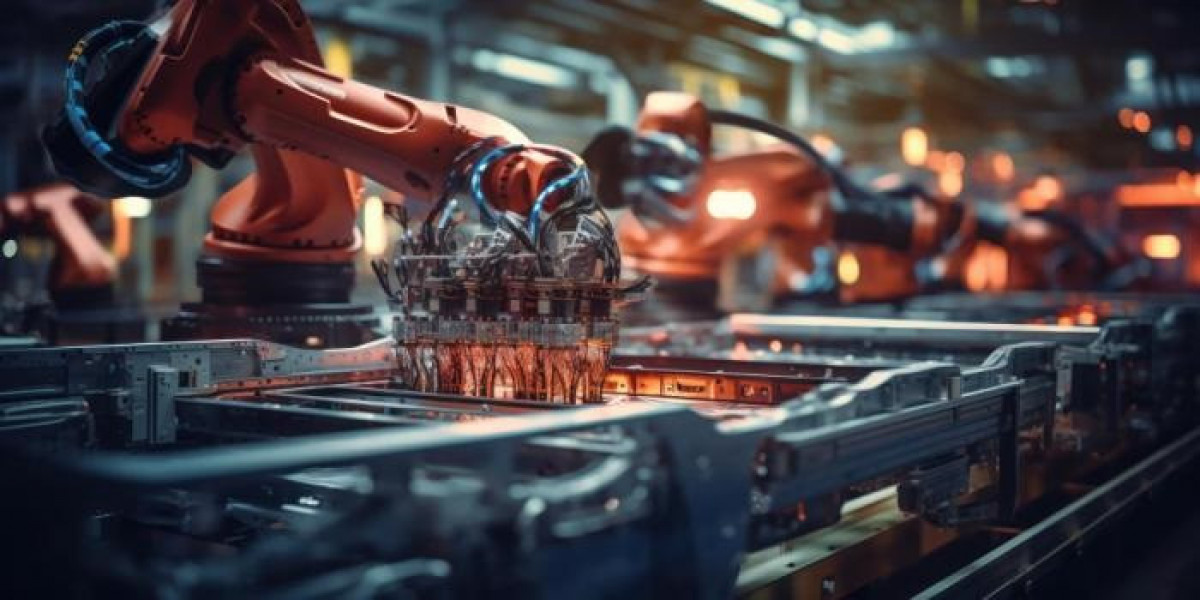Introduction
The manufacturing industry has always been at the forefront of technological advancements. From the Industrial Revolution to the present day, manufacturers have continually sought ways to increase efficiency, reduce costs, and improve product quality. In recent years, the integration of Information Technology (IT) services into manufacturing processes has become a game-changer, leading to what many refer to as the Fourth Industrial Revolution or Industry 4.0. This article explores the impact of IT services on manufacturing, the benefits, challenges, and future trends in this evolving landscape.
The Role of IT Services in Manufacturing
Enhancing Efficiency and Productivity
One of the primary benefits of integrating IT services into manufacturing is the significant boost in efficiency and productivity. Advanced IT solutions, such as Enterprise Resource Planning (ERP) systems, Manufacturing Execution Systems (MES), and automation software, enable manufacturers to streamline their operations, reduce downtime, and optimize resource allocation.
ERP systems, for instance, provide a centralized platform where manufacturers can manage their business processes in real-time. This integration allows for better coordination between different departments, such as procurement, production, and sales, ensuring that materials and products move seamlessly through the supply chain.
Improving Quality Control
Quality control is a critical aspect of manufacturing IT services play a vital role in ensuring that products meet the required standards. Advanced analytics and data-driven approaches allow manufacturers to monitor production processes closely and identify any deviations or defects in real-time. This proactive approach to quality control helps in reducing waste, minimizing rework, and ensuring customer satisfaction.
Facilitating Predictive Maintenance
Maintenance is another area where IT services have a profound impact. Traditional maintenance practices are often reactive, leading to unexpected equipment failures and costly downtimes. However, with the advent of predictive maintenance, powered by IoT (Internet of Things) sensors and machine learning algorithms, manufacturers can predict when a machine is likely to fail and perform maintenance proactively. This shift from reactive to predictive maintenance not only reduces downtime but also extends the lifespan of equipment and lowers maintenance costs.
Enabling Smart Manufacturing
The concept of smart manufacturing revolves around the use of advanced technologies to create a highly automated and connected manufacturing environment. IT services are at the core of this transformation. Through the integration of IoT, big data analytics, cloud computing, and artificial intelligence (AI), manufacturers can achieve unprecedented levels of automation, connectivity, and intelligence in their operations.
For example, IoT devices can collect data from various points in the production process, allowing manufacturers to monitor equipment performance, track inventory levels, and ensure product quality in real-time. This data can then be analyzed using big data analytics to uncover insights and trends that drive continuous improvement.
Key IT Services Transforming Manufacturing
Cloud Computing
Cloud computing is revolutionizing the way manufacturers manage their IT infrastructure and data. By leveraging cloud services, manufacturers can store and process large volumes of data without the need for extensive on-premises hardware. This scalability allows for greater flexibility and cost savings.
Moreover, cloud-based applications enable remote access to critical information, facilitating collaboration among teams spread across different locations. Manufacturers can also benefit from the latest software updates and security patches without the hassle of manual installations.
Internet of Things (IoT)
IoT is a cornerstone of modern manufacturing, enabling the creation of a connected ecosystem where machines, devices, and systems communicate with each other. IoT sensors embedded in equipment and products collect real-time data, providing valuable insights into production processes, machine health, and product performance.
This connectivity allows manufacturers to implement predictive maintenance, monitor production quality, and optimize energy consumption. IoT also enables the creation of digital twins—virtual replicas of physical assets—that help in simulating and analyzing performance under different conditions.
Big Data Analytics
The manufacturing industry generates vast amounts of data, from production metrics to supply chain information. Big data analytics helps manufacturers make sense of this data by identifying patterns, correlations, and trends that drive informed decision-making.
By analyzing historical and real-time data, manufacturers can optimize production schedules, improve demand forecasting, and enhance quality control. Additionally, big data analytics can be used to develop new products and services that meet evolving customer needs.
Artificial Intelligence (AI) and Machine Learning
AI and machine learning are transforming manufacturing by enabling intelligent automation and decision-making. Machine learning algorithms can analyze data from various sources to predict equipment failures, optimize production processes, and improve supply chain management.
AI-powered robots and automated systems are increasingly being used in manufacturing plants to perform repetitive and complex tasks with high precision. These robots can work alongside human workers, enhancing productivity and safety.
Cybersecurity
As manufacturing becomes more digitized, the importance of cybersecurity cannot be overstated. IT services play a crucial role in protecting manufacturing systems from cyber threats. Manufacturers must implement robust security measures, including firewalls, encryption, and intrusion detection systems, to safeguard their data and operations.
Additionally, regular security audits and employee training are essential to ensure that cybersecurity protocols are followed diligently. With the rise of ransomware and other cyber threats, manufacturers must stay vigilant and proactive in their cybersecurity efforts.
Challenges in Integrating IT Services into Manufacturing
High Initial Costs
While the benefits of IT services in manufacturing are substantial, the initial costs of implementation can be a barrier for some manufacturers. Investing in new technologies, upgrading infrastructure, and training employees require significant financial resources.
Legacy Systems Integration
Many manufacturers still rely on legacy systems that may not be compatible with modern IT solutions. Integrating these outdated systems with new technologies can be complex and time-consuming. It often requires custom solutions and significant technical expertise.
Data Privacy and Security Concerns
The increased connectivity and data sharing in smart manufacturing raise concerns about data privacy and security. Manufacturers must ensure that sensitive information is protected from unauthorized access and breaches. Compliance with data protection regulations, such as GDPR and CCPA, is also crucial.
Skill Gaps
The successful integration of IT services in manufacturing requires a workforce with the necessary skills and expertise. However, there is often a gap between the skills needed for advanced manufacturing technologies and the skills available in the workforce. Manufacturers must invest in training and development programs to bridge this gap.
Resistance to Change
Change management is a critical aspect of digital transformation. Some employees may resist adopting new technologies and processes due to fear of job displacement or lack of understanding. Manufacturers must address these concerns through effective communication, training, and involvement of employees in the transformation process.
Future Trends in Manufacturing IT Services
Digital Twins
The concept of digital twins is gaining traction in manufacturing. A digital twin is a virtual representation of a physical asset, system, or process. It allows manufacturers to simulate, analyze, and optimize performance in a virtual environment before implementing changes in the real world. This technology can significantly reduce the risk and cost associated with modifications and innovations.
5G Connectivity
The rollout of 5G networks promises to revolutionize manufacturing by providing ultra-fast and reliable connectivity. 5G will enable real-time data transmission, low-latency communication, and enhanced IoT capabilities. Manufacturers can leverage 5G to improve automation, remote monitoring, and control of production processes.
Edge Computing
Edge computing involves processing data closer to the source of data generation, rather than relying on centralized cloud servers. In manufacturing, edge computing can enhance real-time decision-making, reduce latency, and improve data security. It is particularly useful for applications that require immediate response, such as autonomous robots and predictive maintenance.
Blockchain Technology
Blockchain technology offers a decentralized and transparent way to manage and verify transactions. In manufacturing, blockchain can be used to enhance supply chain traceability, ensure product authenticity, and streamline procurement processes. It provides a secure and immutable record of transactions, reducing the risk of fraud and counterfeiting.
Augmented Reality (AR) and Virtual Reality (VR)
AR and VR technologies are finding applications in manufacturing for training, maintenance, and design. AR can overlay digital information onto the physical world, assisting workers in assembling complex components or diagnosing equipment issues. VR can create immersive training environments where employees can practice tasks without the risk of accidents.
Conclusion
The integration of IT services into manufacturing is transforming the industry in unprecedented ways. From enhancing efficiency and quality control to enabling predictive maintenance and smart manufacturing, IT services are driving the evolution of modern manufacturing. While there are challenges to overcome, such as high initial costs and skill gaps, the benefits far outweigh the drawbacks.
As we look to the future, emerging technologies like digital twins, 5G connectivity, edge computing, blockchain, and AR/VR will continue to shape the manufacturing landscape. Manufacturers that embrace these technologies and invest in their implementation will be well-positioned to thrive in the competitive global market.
In conclusion, the symbiotic relationship between manufacturing and IT services is a testament to the power of innovation. By harnessing the potential of IT services, manufacturers can achieve new levels of productivity, efficiency, and agility, paving the way for a brighter and more technologically advanced future.








